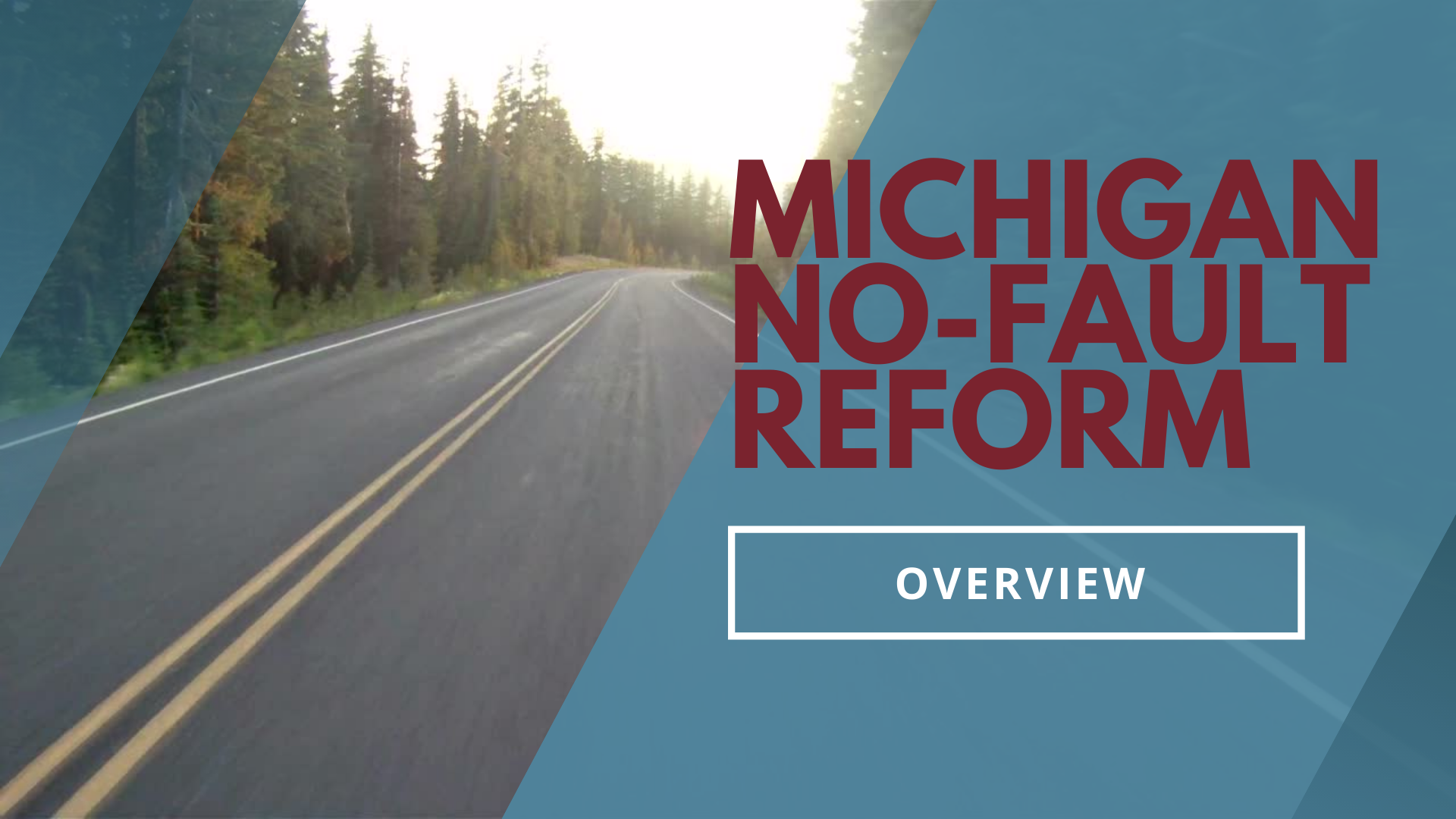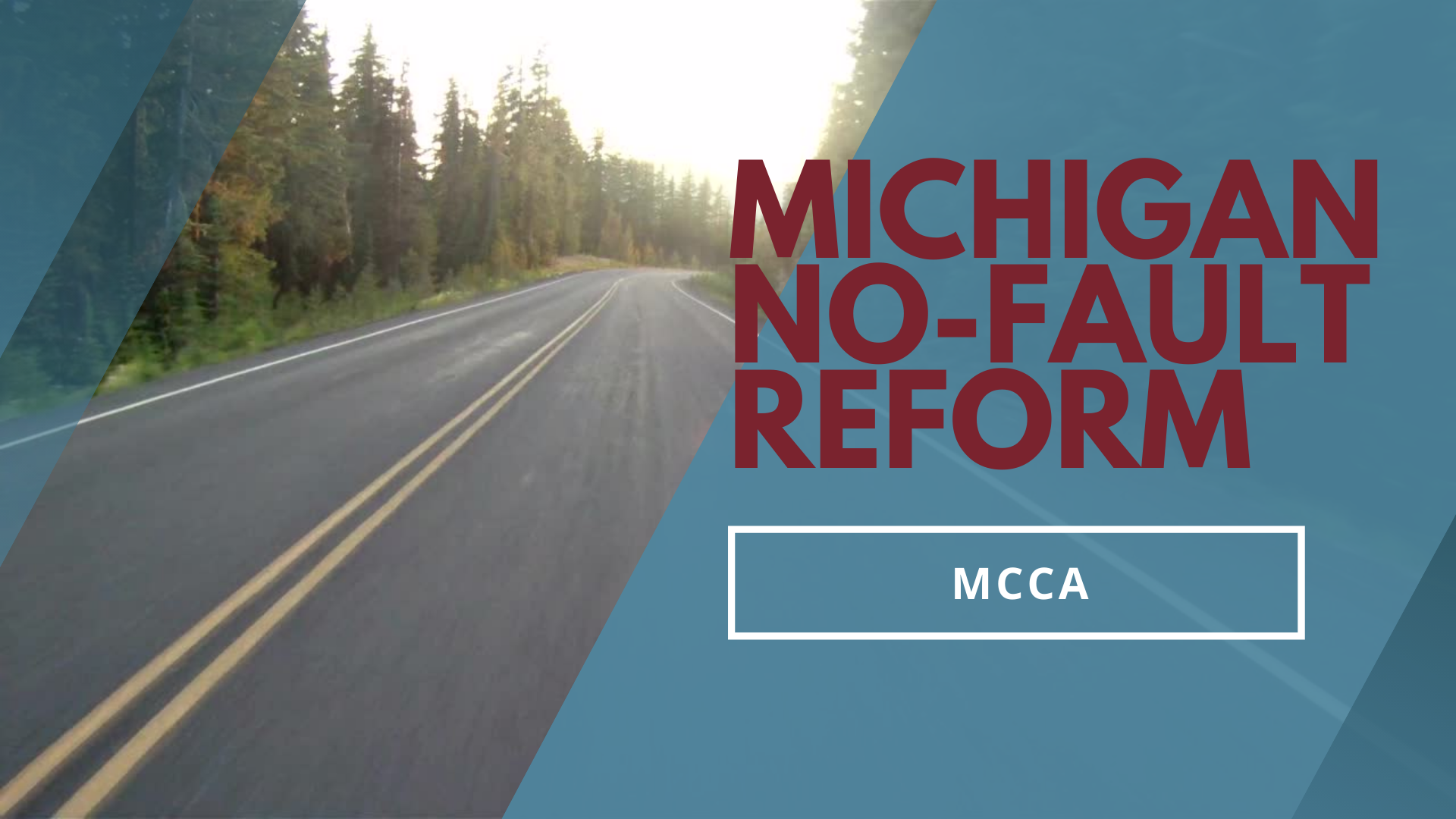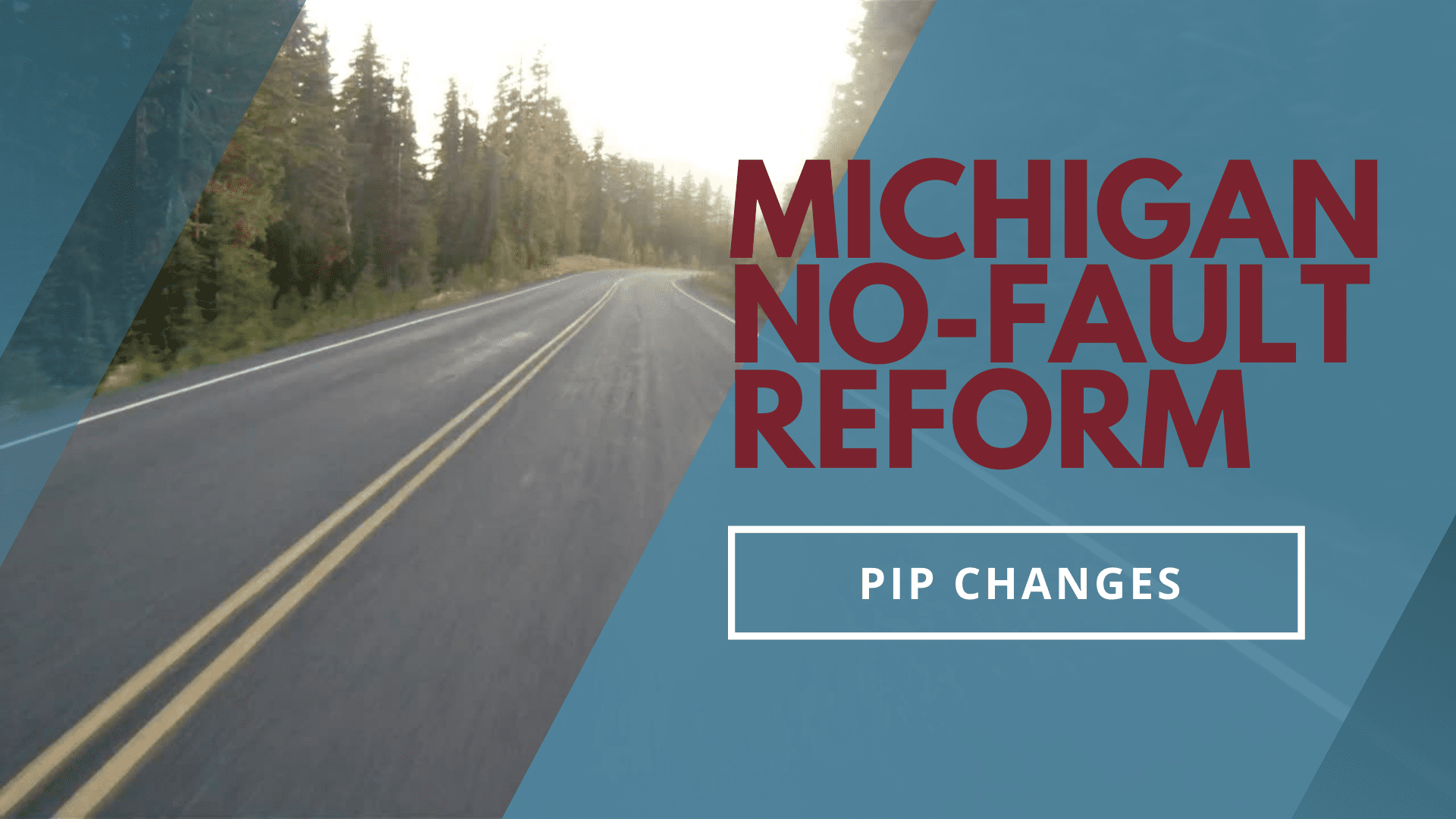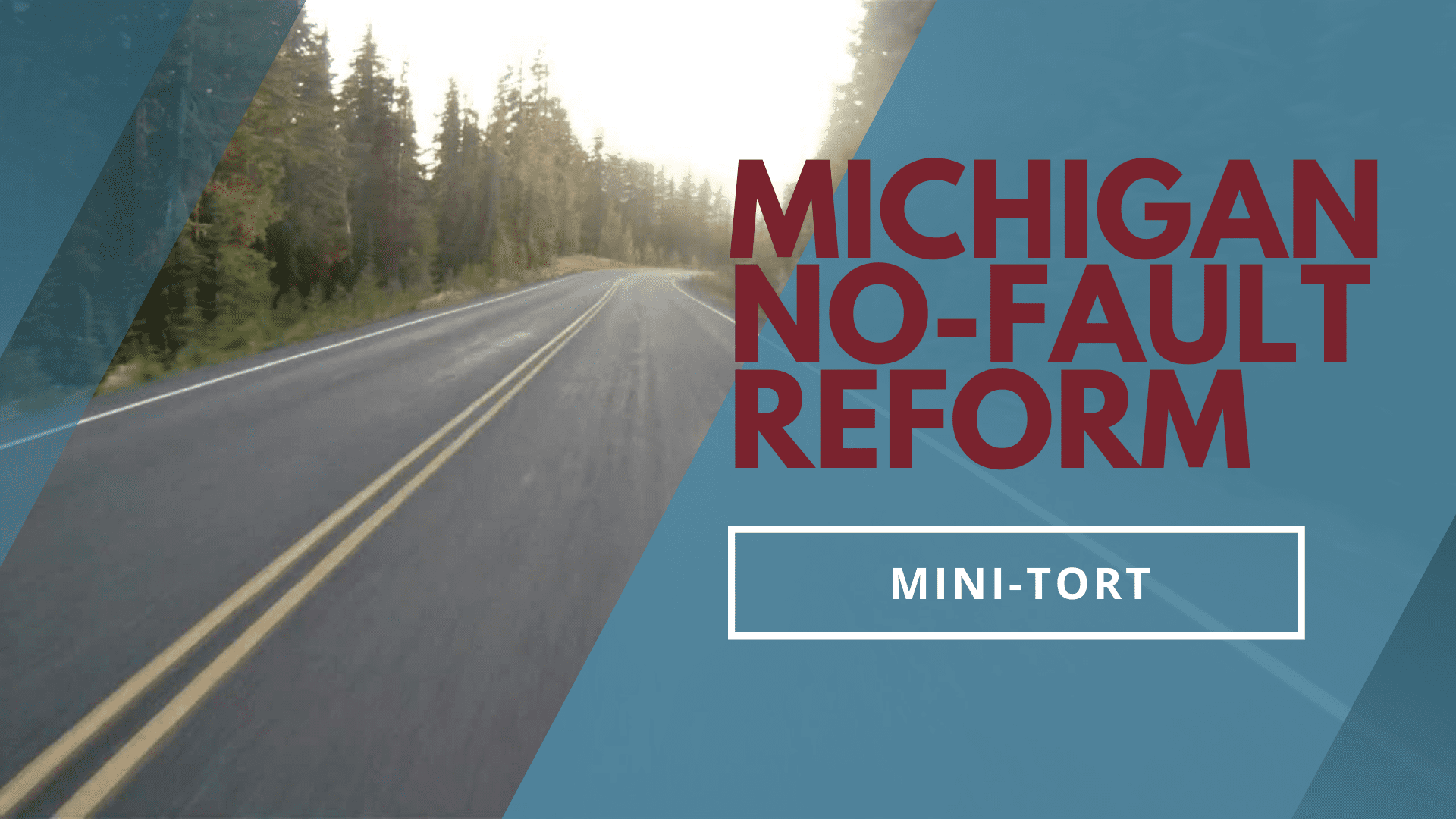Helping you navigate Michigan’s new No-Fault Auto Insurance Laws.
Changes To Michigan Auto Insurance.
The reformed Michigan no-fault law now offers drivers more choices, as well as changes to their auto insurance. While some of these changes will be phased in over time, most went into effect on July 2, 2020.
Contact us and we will help you understand how your auto insurance coverage is affected.
General Overview
3:45
There are upcoming changes to Michigan auto insurance. Here’s a general overview of what you need to know.
What is the MCCA?
0:50
What is the MCCA and how is that changing with No-Fault Reform?
PIP Coverage Changes
1:22
Part of the No-Fault reform changes how personal injuries will be covered as a result of an auto accident.
Mini-Tort Coverage
1:05
What is the change in the mini-tort coverage when the new law goes into effect?
Frequently Asked Questions
What is Changing?
The changes that are happening are related to having a choice on what medical limits you have on your auto policy, a new minimum liability limit as well as some changes on household members.
Personal Injury Protection (PIP) benefits
Most of this new law goes into effect on July 2, 2020. At that time, you will be given choices in the amount of coverage you wish to purchase for medical costs related to auto accidents. Everyone can choose to keep the current unlimited, lifetime benefit coverage that we have had for decades, or you can choose to purchase lower limits of $500,000 or $250,000. Some people may be able to purchase as low as $50,000 if you have Medicaid. You may be able to choose to decline all medical coverage if you have Medicare or some health insurance plans. Your insurance company will send you option forms about 90 days before your renewal. More details about your individual policy will be provided then.
Liability Coverage
There will also be choices to be made about your liability protection if you’re sued. Again, more details will be sent to you about 90 days before your policy renews after July 2, 2020.
Premium Rate Changes
There are several rating factors that may change your rates. Some of the factors that can no longer be used are credit score, education level, and homeownership and zip code. We do know that the MCCA charge will be reduced from a current charge of $220 to $100 per car per year if you choose to keep unlimited medical coverage. The charge will be eliminated completely if you choose any medical coverage other than the unlimited.
Don’t worry if you do not understand all the changes or even what certain insurance terms mean, our website will help you understand what is happening and how it can affect you. As always please contact us if you still have questions! We are here to serve and guide you through this law change.
What is PIP and Why Do I Need It?
PIP is short for Personal Injury Protection. The State of Michigan defines it as “all reasonable charges incurred for reasonably necessary products, services and accommodations for an injured person’s care, recovery or rehabilitation.”
Simply put, PIP is medical and rehabilitation coverage that is a part of your Michigan auto policy. Until July 2, 2020, this has been a mandatory coverage with an unlimited benefit.
Currently, within their auto policy, every Michigan driver has the best medical coverage in the United States, which is unlimited medical coverage for life. Yes, you read that correctly, unlimited for life! Starting July 2, 2020, everyone will have the option to opt-out of this unlimited coverage and choose a lower limit of capped PIP coverage. The medical coverage choices a customer will have are listed below. Below we have some information to give you an understanding of what PIP covers and what your medical insurance won’t cover.
New Choices of PIP Coverage
- Unlimited
- $500,000
- $250,000
- * $50,000 – certain restrictions apply
- * $0 – certain restrictions apply
BEFORE THE CHANGE IN LAW: If a motor vehicle was involved in an accident, any injuries from an auto accident suffered by a driver, passengers, or pedestrians would be covered by the auto insurance of the owner or operator of the motor vehicle. This was true if the driver, passenger, or pedestrian didn’t have their own car insurance. If they had their own car insurance, the injuries would be covered by that insurance. There were no requirements that the driver, passengers, or pedestrians be related to the owner or operator of the motor vehicle or be a member of the household.
UNDER THE NEW LAW: The only people covered your auto policy for injuries resulting from an accident involving your vehicle will be you and anyone who is related to you AND resides in your household. Here are some examples of what that means: There will no longer be medical coverage for your roommate or significant other, even if that person is listed as a driver on your policy. There will also not be medical coverage for your adult child who does not live with you but drives a car titled to you.
Please contact your agent to discuss the best way to obtain coverage for these situations.
Is the MCCA Fee Changing with No-Fault Reform?
The MCCA is the Michigan Catastrophic Claims Association and it pays for catastrophic medical claims as a result of a car accident.
The current charge is $220 per car per year which is built into your auto insurance premium. On July 2, 2020, that charge will go down to $100 per car per year until June 30, 2021. This will only be charged on policies when the insured chooses unlimited medical coverage. Those who choose lower limits under the new no-fault law will not be charged with the assessment as long as the MCCA is not in a deficit position. That means there could be a different charge in 2021.
The MCCA states that the 55% reduction results directly from savings created by cost controls for medical treatment and other changes made to Michigan’s no-fault insurance law on June 11, 2019. These changes are estimated to erase the MCCA’s deficit of approximately $2 billion and reduce the annual MCCA assessment by approximately $1 billion.
Mini-Tort, What is it and is it Changing?
On 7/2/2020, when the no-fault reform goes into effect, the mini-tort coverage limit will increase from $1000 to $3000 for all insureds who have that coverage.
Mini-Tort covers you if you are at-fault in an auto accident in Michigan and the other vehicle doesn’t have collision coverage or has standard collision. Standard collision means they have to pay their deductible regardless of fault. Under the no-fault law, the owner of the other vehicle has the right to collect from you for those damages. As of July 2, the other party can collect up to $3000 instead of the current $1000.
What is Auto Liability?
Auto Liability is coverage that protects you and your assets in the event that you are named in a lawsuit due to an auto accident. That State of Michigan sets the minimum amount of coverage that you can legally have. The current minimum limit is $20,000 per person and $40,000 per accident. Broken down, this means that you can injure 2 people in one accident and they will each get $20,000 for a total policy payout of $40,000. This is changing with the new law.
- The default limit will become $250,000 per person and $500,000 per accident as of 7/2/2020- if you want lower limits you will need to request a decrease and you will need to sign paperwork stating that you understand the risks of having lower limits.
- The lowest that you will be able to choose will be $50,000 per person and $100,000 per accident.
- Lower limits are not always the best choice.
Who is in Your Household?
The new no-fault reform laws change who can be insured on your auto policy.
- It states that only a “named insured, spouse or resident relative of either” is eligible for PIP coverage on your policy.
- If there are other people that are listed on your policy that do not qualify under this rule, they do not have the correct coverage and can be responsible for paying medical bills related to an auto accident.
The key here is the phrase “resident relative”.
- What is a resident relative?
- This is someone that is legally related to you and that lives in your household full time.
- A child that is going to school, and lives there during the school year, but lives in your home during breaks and the summer.
- What is not a resident relative?
- A girlfriend or boyfriend that lives with you.
- A child that has left your home to go to school, or work and has no intention of living with you again.
- A friend that is just staying with you temporally.
If you have anyone that is not a resident relative listed on your policy, or that drives your vehicles regularly, you need to call and talk to an agent, right away, to find out what the options are to correct this.
If someone on your policy is found to not be a resident relative at the time of an accident, they will only have a limited amount of coverage out of the Michigan assigned claims plan.
What do I Need to Know as a Motorcyclist?
Generally, motorcyclists will pursue coverage in the same order of priority as under the previous law. This means that if the owner/registrant of the motor vehicle has limits less than “unlimited” selected for their no-fault policy, the motorcyclist will receive those same limited benefits selected by the driver, regardless of the motorcyclist’s own PIP coverage. If the motor vehicle involved has opted out of PIP, then the motorcyclist will go to the next order of priority, which is the vehicle driver’s insurance, then to the motorcyclist’s own insurance company.





